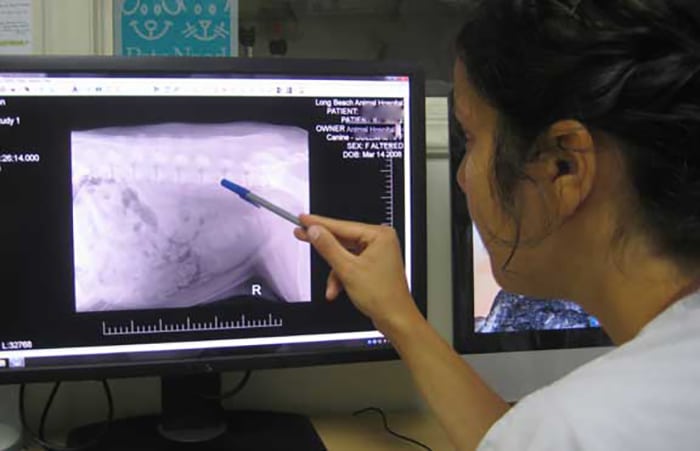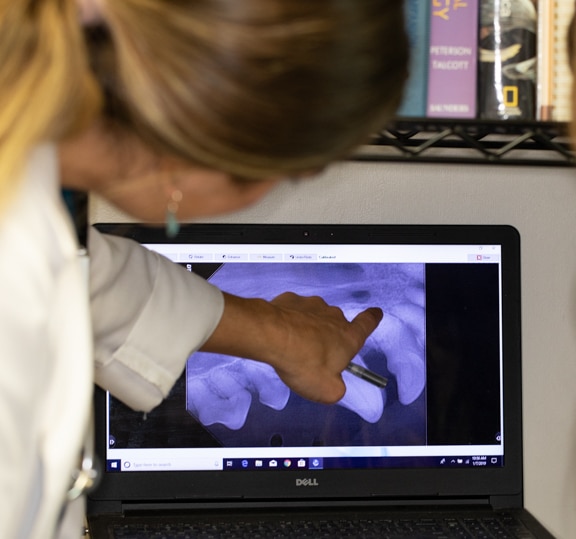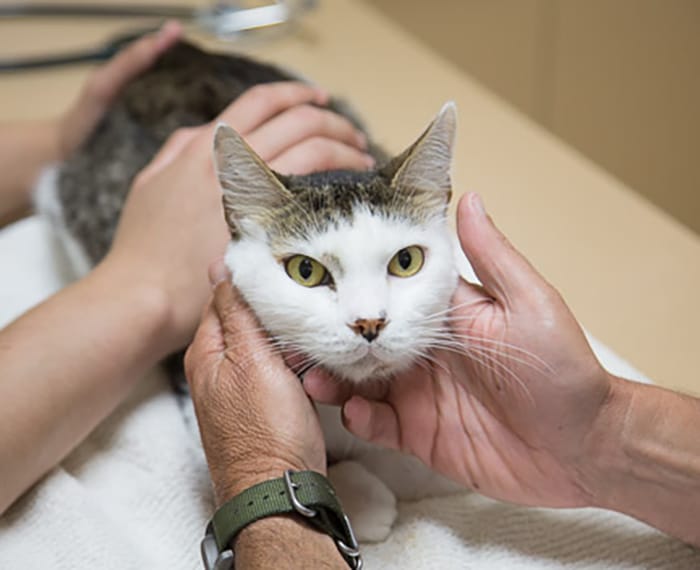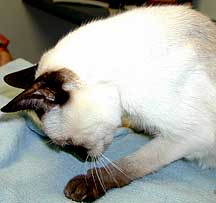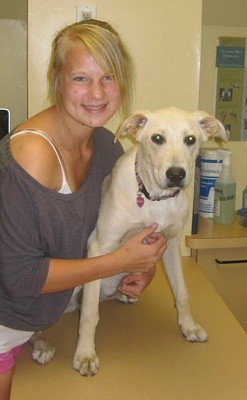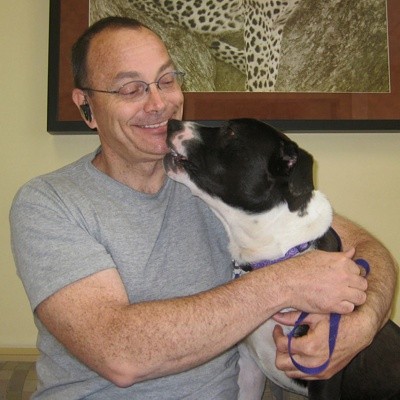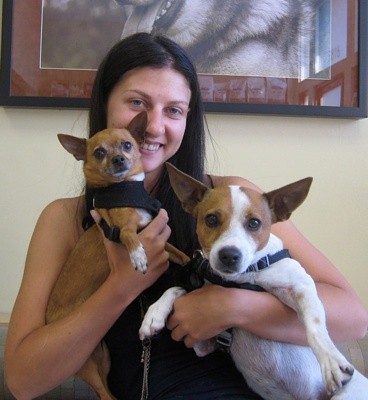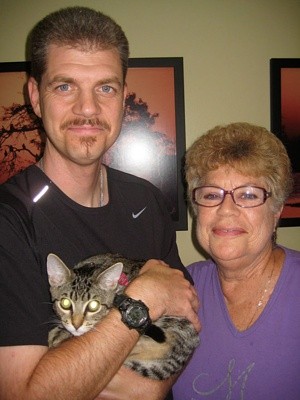Geriatric (senior) care
In the past, we may have accepted a declining quality of life for our aging pets as a fact of life beyond our control. Like humans, older dogs and cats are more likely to encounter health problems than younger pets. Thanks to advances in veterinary medicine, pets are living longer than ever before.
One of those advances that allows us to detect and treat disease in animals before the problem becomes debilitating is digital radiography. We have a fun page on Digital Radiography if you want to learn more, and also try your hand at making a diagnosis.
Most humanoids are practicing preventive medicine at middle age- routine physical exams, breast exams, prostate exams, blood pressure checkups, blood panels, and implementing dietary changes. Dogs and cats need similar preventive medicine as they reach 7 years of age (earlier in the giant breeds like Great Danes).
Since they age approximately 7 years for every 1 year of human life, an 8 year old dog or cat is equivalent to a 56 year old person, and a 9 year old dog or cat is equivalent ot a 63 year old person. This rapid yearly increase in equivalent age emphasizes the fact that we need to pay close attention to all dogs and cats as they move beyond 7 years of life.
Just as older people experience a progressive decline in physical condition, so do senior pets. Studies indicate that 36% of senior dogs suffer from osteoarthritis, 18% show signs of Cognitive Dysfunction Syndrome, and the number one diagnosed disease of dogs in all age groups is dental disease. Compared to humans, old age problems may progress up to 7 times faster in senior pets.
We want to prevent dental disease before your pet gets to the point that we need to take x-rays to look for rotten teeth that are painful. Our Dental Page gives you all the details on how to prevent this painful problem.
Having your senior pet examined only once a year is like a senior person visiting the doctor only once every seven years. That is why, as your pet nears 7 years of age (5 years of age in Giant Breeds), preventive senior exams every 6 months can help assess your pet’s current health, provide a baseline for monitoring changes in the years ahead, and help detect health problems in the early stages, when diseases can be treated more effectively. This is all performed during our Wellness Exam.
In our Learning Center we have a section where we show you how to perform an In-Home Exam on your pet. This is especially important on senior pets, and in addition to the lessons on the In-Home Exam link, we will do it with you in person anytime you bring in your pet for an exam.
Your confidence in how to perform this basic exam will increased when our staff gives you a hands-on demonstration
Senior Care is “geriatric” medicine for pets. Senior health care implies both preventive and therapeutic approaches to medicine, including nutrition, dental care, and exercise as well as therapy for diseases.
This cat was brought to us with the owner convinced his cat was holding his head like this “just cuz he was getting older” This cat has kidney disease causing low potassium (hypokelemia). It was diagnosed with a blood panel and urinalysis, and treated successfully. We would have caught this problem before it got to this point if we had seen this cat earlier for a routine exam.
The medical term is venture-flexion
Age Chart
|
|
||||||||||||||||||||||||||||||||||||||||||||||||||||||||||||||||||||||||||||||||||||||||||||||||||||
Symptoms
Changes in behavior or appearance may be the first indication of a problem. However, these signs may not be apparent in the exam room during your veterinary visit. It is important for you to watch for subtle changes, especially in stoic older pets. Please use the following form to help you analyze your pet.
Signs of aging that need attention:
Difficulty climbing stairs
Difficulty jumping up
Increased stiffness or limping
Loss of house training
Increased thirst
Increased urination
Changes in activity level
Excessive panting
Circling/Repetitive movements
Confusion or disorientation
Excessive barking
Less interaction with family
Decreased responsiveness
Tremors or shaking
Skin and hair coat changes
Changes in sleeping patterns
Less enthusiastic greeting or behavior
Altered appetite
Weight change
Common Health Conditions of Senior Pets
| Dental Disease | Inflammation of the teeth and gums may lead to pain, infection, tooth loss, bad breath, kidney and heart disease, and, as a result, decrease your pet’s life expectancy.
|
| Obesity | As your pet’s metabolism slows down, weight gain can increase his or her risk of arthritis, disc disease, and diabetes.
|
| Endocrine: | Endocrine diseases involve the hormones. Hormones have profound influence on health and aging. They circulate in small quantities in the bloodstream, affected by negative feedback loops directed by the brain in its neuroendocrine function.
Elderly pets often experience changes in thyroid, pancreas, and adrenal gland function that can negatively affect the heart, digestive system, as well as liver and kidney. There are a vast array of different and overlapping symptoms with these diseases, and they commonly occur simultaneously. This is called a co-morbidity. These five endocrine diseases are the most common ones in aging pets.
|
| Kidney | Failure of this organ can lead to chemical imbalances, anemia, compromised immune function, and blood clotting defects as well as altered mental capacity. Kidney disease is a leading cause of death in geriatric cats. Chronic Urinary Tract Infections can easily occur without you being aware. These are painful, and can predispose your pet to bladder stones.
|
| Liver | Failure can lead to chemical imbalances, anemia, compromised immune function, and blood clotting defects as well as altered mental capacity.
|
| Heart Disease | Pets with heart disease can experience difficulty breathing, fatigue, exercise intolerance, and lethargy.
|
| Arthritis | Arthritic joints are not only painful, they make it difficult for your pet to climb stairs, run, or even jump into your lap.
|
| Vision Loss | Older animals are at risk for cataracts, glaucoma, and nuclear sclerosis (a natural aging process that “clouds” the eye).
|
| Cancer | Early detection may improve the prognosis. Many treatments are available and most have few side effects.
|
| Senility or “Old Dog” Behavior Changes |
What people may pass off as just “getting old,” can actually be symptoms of a treatable disease. Pets suffering from canine Cognitive Dysfunction Syndrome may appear disoriented, forget house training, sleep more, and interact less with family members. |
Senior Exam
With frequent checkups, at least twice a year, we can screen for common senior diseases during a Wellness Exam. By diagnosing and treating problems earlier, we may be able to slow the disease process and prevent pain and discomfort.
In addition to a complete physical examination, diagnostic tests can help detect many diseases before your pet displays signs of a condition. Even if results are normal, the findings give us a good baseline to identify and monitor changes in your pet’s health as the years progress.
| Physical Examination | We can check for physical signs of cancer, arthritis, heart and lung disease, dental disease, or cataracts.
|
| Complete Blood Count (CBC) |
This test helps identify infections, anemia, and certain types of cancer as well as problems with bleeding and the immune system.
|
| Serum Chemistry Profile | This blood test can help identify diseases of the liver and kidney, and endocrine disorders such as Diabetes , Addison’s disease, or Cushing’s.
|
| Complete Urinalysis | A urine sample can help test for kidney disease, diabetes, urinary tract infections, and bladder stones.
|
| Fecal Exam | A fecal sample can be checked for internal parasites and bacterial overgrowth.
|
| Other Tests | Depending on your pet’s overall health, we may recommend additional tests such as blood pressure measurement, radiographs, electrocardiography (ECG or EKG), ultrasound, thyroid (hyperthyroid or hypothyroid) or adrenal gland (Cushing’s or Addison’s) testing, as well as liver, pancreas, and small intestine function tests.
|
Senior Nutritional Needs
Nutritional needs of pets change as they get older. Senior dogs should consume fewer calories due to decreased activity and reduced daily energy needs. This is very important because obesity increases the risk of serious diseases, arthritis, diabetes, cardiovascular disease, respiratory disease, and musculoskeletal disorders in older dogs.
Pet foods, specifically for seniors, are now available with fewer calories, limited phosphorous, more protein, balanced fatty acids, antioxidants, vitamins and minerals to meet the specific nutritional needs of senior pets. These foods have optimum amounts of nutrition, and can help in the progression of common diseases like kidney disease.
The Prescription Diets by Hill’s are the gold standard when treating problems in older pets. We have a complete page to help you understand which diet one of our doctors is recommending.
Before you read up on these important diets you need to educate yourself on pet foods, and go beyond what you are told at a pet store or read on the Internet by someone who has no formal education in nutrition, has not treated tens of thousands of sick pets like our doctors have, who have not examined your pet and determined it body condition score, do not have access to your pet’s diagnostic tests, and don’t have any idea how to interpret these tests. You get the idea.
WE'RE HERE WHEN YOU NEED US. 562-434-9966
OFFICE HOURS
Monday - Friday 7:30AM - 10:00PM
Saturday 8:00AM - 10:00PM
Sunday 10:00AM - 10:00PM
WILDLIFE PHOTOGRAPHY
Learn how we care for wildlife and how
Dr. P teaches wildlife photography
around the world.
WELCOME TO OUR FAMILY
LBAH COMMUNITY
Meet some of the clients that have brought their pets to us recently.






